Sent to Halifax: One town's asylum story
- Published
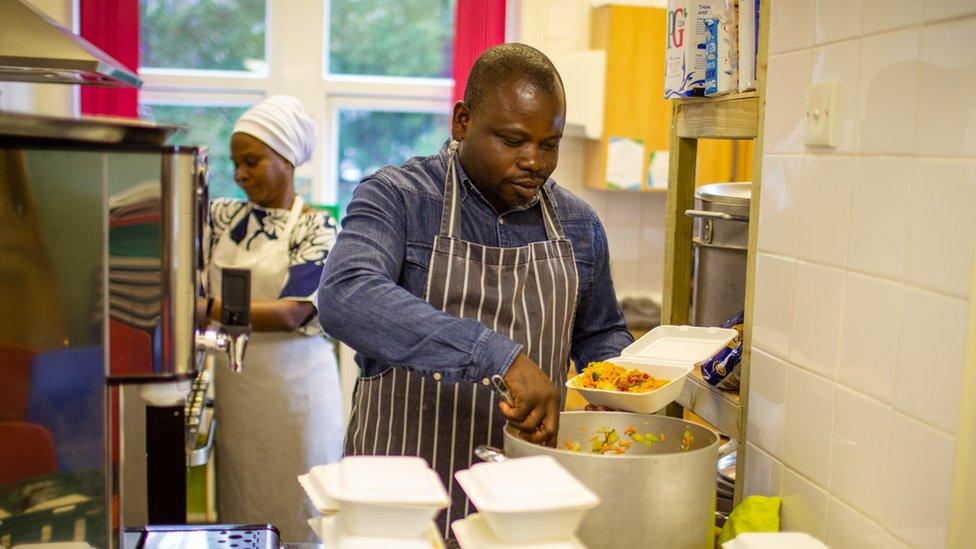
St Augustine's volunteers cook lunch for the local community
What is life like for asylum seekers trying to settle in the UK - and how do local people feel about accepting more of them? Here is what I found in one Yorkshire town with a long history of providing refuge for those fleeing conflict and persecution.
Walking through the centre of Halifax, it didn't take long to find people willing to talk about recent events in Afghanistan.
Though thousands of miles away the images of people trying to flee Kabul - clinging on to planes and climbing the airport walls - have clearly resonated in this West Yorkshire market town.
The first shopper I stopped described it as "heartbreaking", insisting the UK should open its doors to those in need.
The second said "20,000 would be fine", referring to the government's promise to resettle Afghan refugees in the UK, but if the number crept up that could be a problem.
Calderdale, the borough in which Halifax sits, has a history of providing a home to those seeking sanctuary from war and persecution.
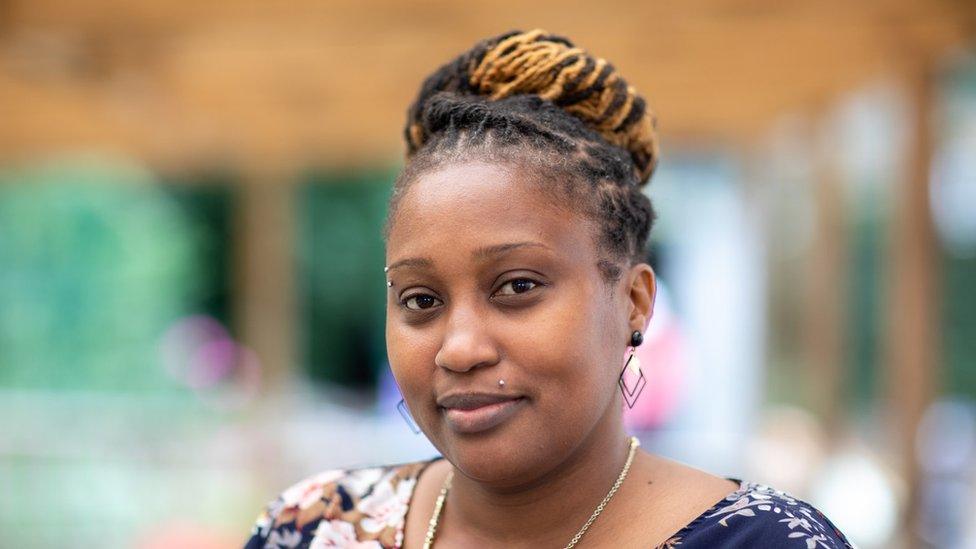
Florence Kahuro still feels the stigma of being an asylum seeker
For more than 20 years it's been part of a system set up to "disperse" asylum seekers across the country to avoid too much pressure on any one area.
Florence Kahuro was sent to Halifax after claiming asylum in 2016.
During the several years in took for her claim to be processed she was not allowed to work, which she said made it hard to settle in the local community.
"When you tell people you are seeking asylum they kind of brush you off," she said.
"We used to get our money from the Post Office, so whenever I had to go there on Monday they'd give you those looks like 'you came to the UK to take our money', and I remember every time I used to dread Monday.
"The trauma that it caused, it doesn't just end when you are granted status, it carries on with you."
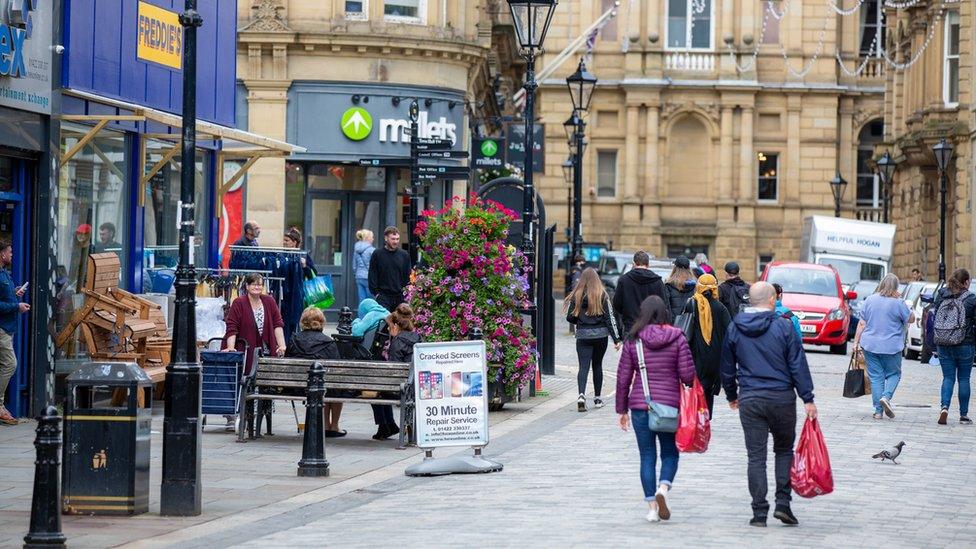
Halifax has been taking in asylum seekers for 20 years
For the sake of her mental health, Florence started volunteering at St Augustine's - a charity in Halifax that provides support, advice and guidance to asylum seekers and refugees.
A large part of their work is helping people integrate in the local community.
Becky Hellewell, a senior caseworker, said: "Integration is a massive thing, because the big delays [in processing asylum claims] really impact people's mental health; the inability to work and their lack of support network.
"We've got a lot of highly-skilled people who get de-skilled over the years because they're in this lengthy process."
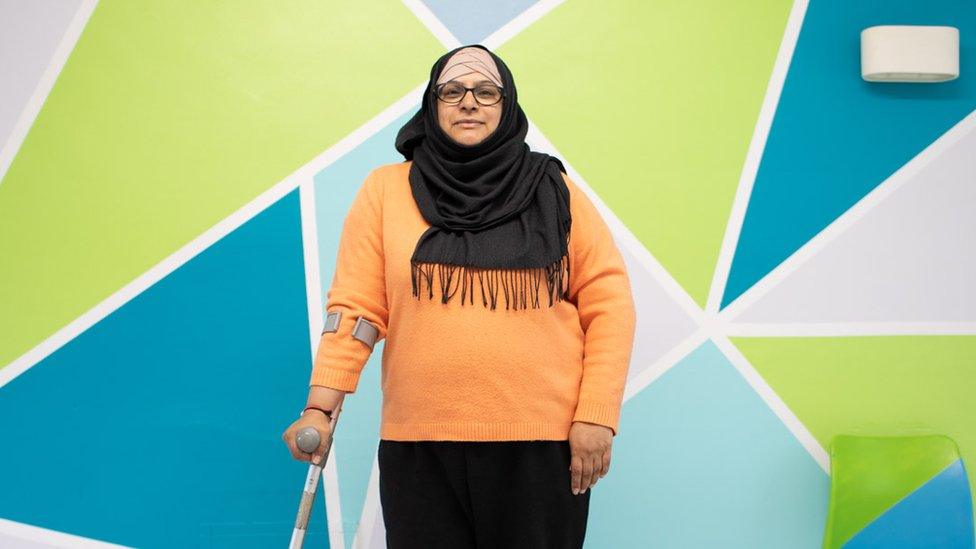
Hina Gilleni says she was determined to be part of the local community
Hina Gilleni knows first-hand how hard it can be.
Threatened with honour-based violence, she fled Pakistan to claim asylum in the UK, and was sent to Halifax while her claim was processed.
She found it "depressing", she says, when people seemed to change their attitude towards her when they found out she was an asylum seeker, "like I committed a crime or something".
"I was educated, I've done a masters in medicine, but I was not be able to do my job. It was just a struggle, it was a nightmare, you just want to dream, that's what we want, and those dreams are taken away from you."
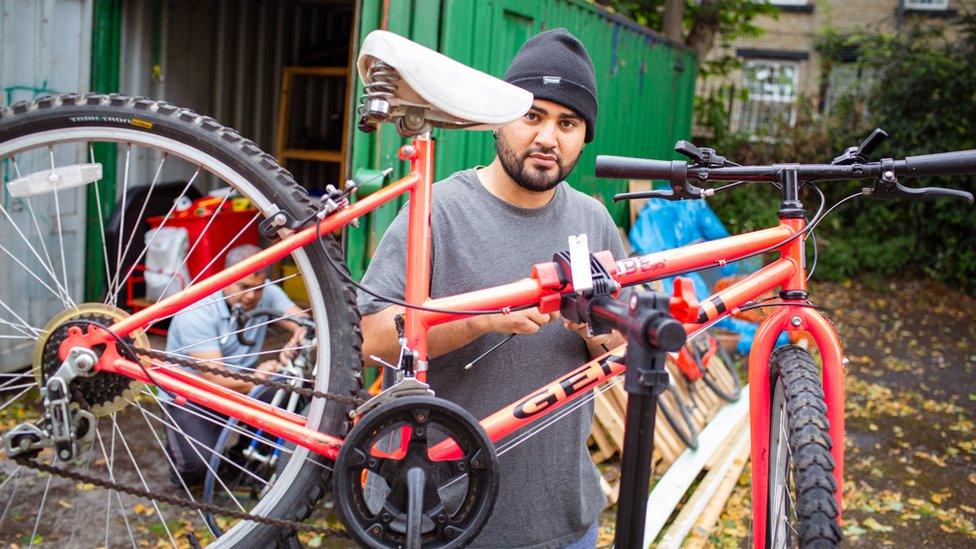
The charity helps people develop useful skills
For her, reaching out to St Augustine's was the first step in feeling like she could be part of the local community,
At any one time there are 300 to 400 people living in Calderdale borough while they wait for their asylum claims to be processed.
The local council also volunteered to take in some 50 refugees from war-torn Syria, and is preparing to do the same for Afghans.

Asylum dispersal in the UK
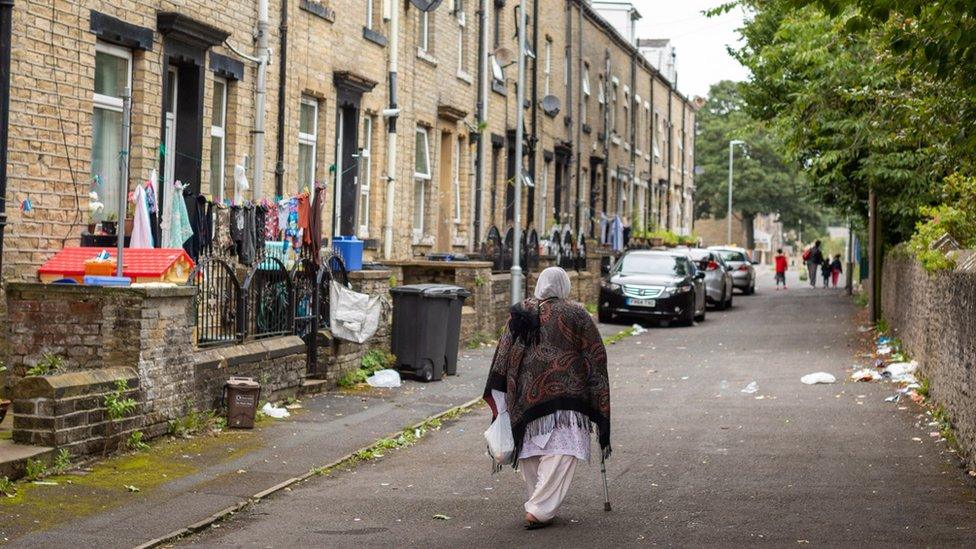
The system of dispersing asylum seekers across the country is uneven, with some areas accommodating far more than others - and 32% of local authorities not taking any at all, according to a House of Commons library report, external.
Areas with lower-than-average household income have tended to accept more asylum seekers - the North East of England has the highest number per 1,000 resident population - 17 times greater than the South-East.
The Home Office has promised that by 2029, the proportion of supported asylum seekers accommodated in each government region will reflect each region's share of the UK population.
Private providers contracted by the Home Office are currently responsible for housing asylum seekers.
Accommodation for those arriving in the UK through any route is a particular pressure point, with increasing use of hotels during the coronavirus pandemic.
The death of a five-year-old Afghan boy, after falling from a Sheffield hotel room window, has raised fresh safety concerns.
Prime Minister Boris Johnson has announced an extra £5m for local councils in England, Scotland and Wales offering to house people arriving from Afghanistan who have worked for the UK.

Calderdale council's Labour leader, Tim Swift, said local people overwhelmingly want to be welcoming, but councils could only step up if the had enough resource to avoid added pressure on local services.
"We're open to doing everything we can to help, but local councils have been under huge pressure, and we do think this is something that needs to be resourced properly under national taxation," he tells me.
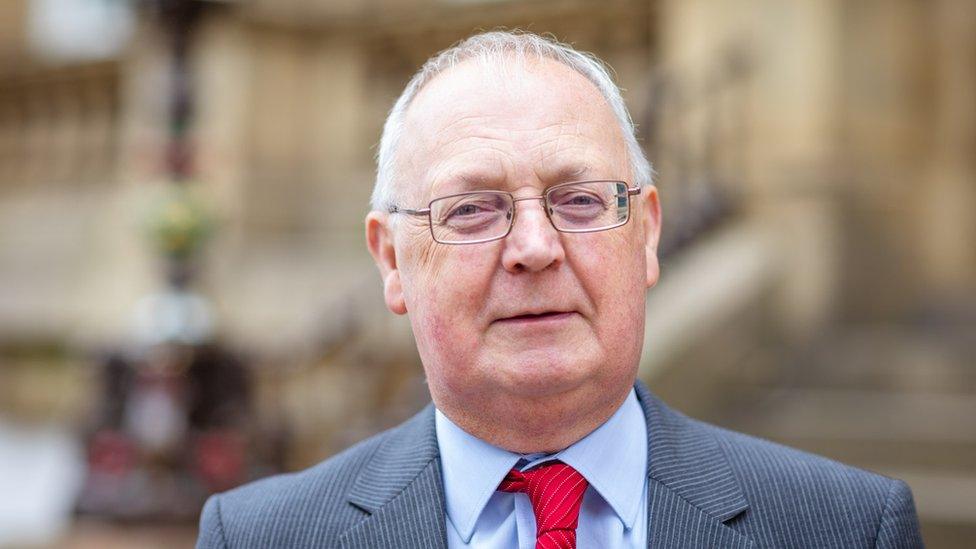
Tim Swift says councils need more financial help
Jacob Cook, as Conservative councillor in Calderdale, said local residents wanted assurance that people who are housed in their area were genuinely in need.
"If they do come from war-torn countries, like the ones who are coming from Afghanistan at the moment, as a councillor and as a local resident there's no problem at all with that - very, very happy to help.
"But if there are people who are playing the system and are trying to gain access to the UK illegally, and they're not really asylum seekers, they've just arrived from Calais and they're economic migrants, that puts a burden on."
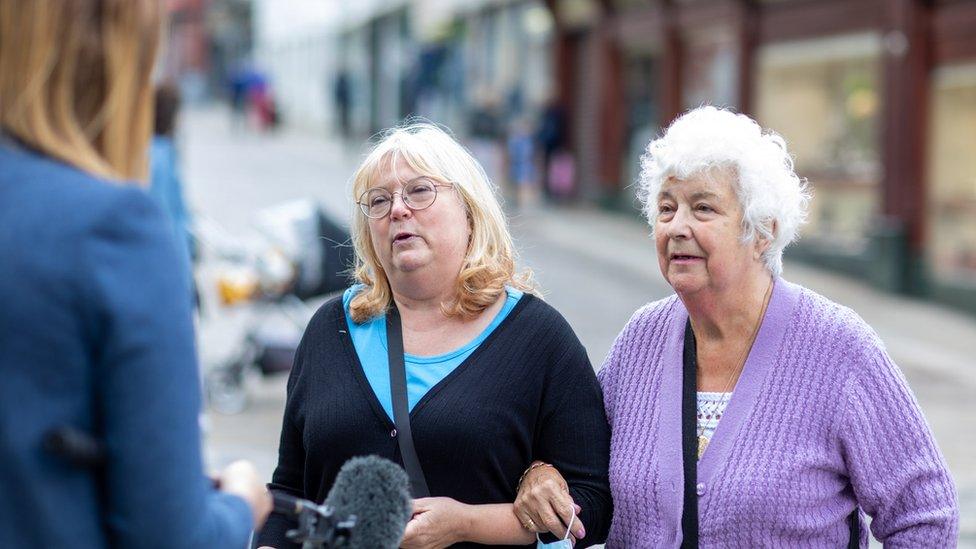
Angela Forsey and Annie Wallwork share their views on Afghanistan
Back in the town centre, local resident Angela Forsey and her mum, Annie Wallwork, stopped me to share their views on the plight of Afghanistan.
"Half of me says yes, we should help out, which is what we're doing, but then the other half is saying there are people in this country, who are British citizens, who need help and support, and to them this can seem totally unfair," said Angela.
Annie added: "As far as the refugees are concerned: if they helped us, when we were out there, then I think we should take some.
"But I can see there's going to be a lot of resistance. Because people are struggling in this country, and unfortunately when people come back in, they don't think about what's gone on over there and how they can help, they just think about our own people that are struggling."
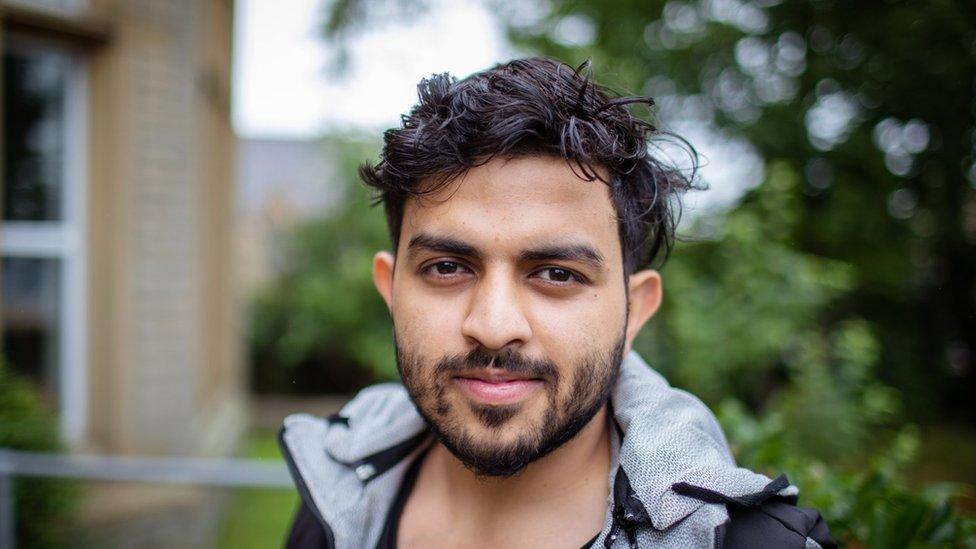
Misbah Almisbahi has won a place at university
Among some of those who've made it to the UK, there is a sense of gratitude at the support communities like Halifax have shown.
Misbah Almisbahi fled the conflict in Yemen in 2019, leaving his family behind and travelling alone. He said it was hard until he realised he had to reach out.
"At the beginning you see people making distance, but as soon as you make the first word people change. It's about who's taking the first step," he said.
"I realised I should do something to make friends and make some relations with people in the community."
Misbah started volunteering at St Augustine's in Halifax, and with their support has just won a place at university in Liverpool.
Sometimes it is a community that shapes someone's future.